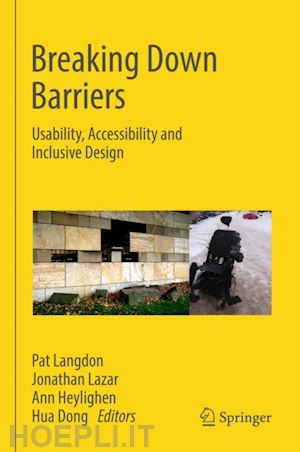
Questo prodotto usufruisce delle SPEDIZIONI GRATIS
selezionando l'opzione Corriere Veloce in fase di ordine.
Pagabile anche con Carta della cultura giovani e del merito, 18App Bonus Cultura e Carta del Docente
The Cambridge Workshops on Universal Access and Assistive Technology (CWUAAT) is one of the few gatherings where people interested in inclusive design, across different fields, including designers, computer scientists, engineers, architects, ergonomists, ethnographers, policymakers and user communities, meet, discuss, and collaborate. CWUAAT has also become an international workshop, representing diverse cultures including Portugal, Germany, Trinidad and Tobago, Canada, Australia, China, Norway, USA, Belgium, UK, and many more.
The workshop has five main themes based on barriers identified in the developing field of design for inclusion:
I Breaking Down Barriers between Disciplines
II Breaking Down Barriers between Users, Designers and Developers
III Removing Barriers to Usability, Accessibility and Inclusive Design
IV Breaking Down Barriers between People with Impairments and Those without
V Breaking Down Barriers between Research and Policy-making
In the context of developing demographic changes leading to greater numbers of older people and people living with impairments, the general field of inclusive design research strives to relate the capabilities of the population to the design of products, services, and spaces. CWUAAT has always had a successful multidisciplinary focus, but if genuine transdisciplinary fields are to evolve from this, the final barriers to integrated research must be identified and characterised. Only then will benefits be realised in an inclusive society. Barriers do not arise from impairments themselves, but instead, are erected by humans, who often have not considered a greater variation in sensory, cognitive and physical user capabilities. Barriers are not only technical or architectural, but they also exist between different communities of professionals. Our continual goal with the CWUAAT workshop series is to break down barriers in technical, physical, and architectural design, as well as barriers between different professional communities.
Jonathan Lazar is a professor of computer and information sciences, director of the undergraduate program in information systems, and founder and director of the Universal Usability Laboratory, all at Towson University. His research focuses on understanding how people with disabilities interact with technologies, how improved interface design can change the quality of life for people with disabilities, and how human-computer interaction and public policy influence each other. During the 2012-2013 academic year, Dr. Lazar was the Shutzer Fellow at the Radcliffe Institute for Advanced Study at Harvard University, researching the relationship between web-based interfaces that are inaccessible to people with disabilities, and how those inaccessible interfaces lead to forms of discrimination that are illegal under US law. Lazar has published more than 120 refereed articles in journals, books, and conference proceedings. He has also authored three books and edited three, including Research Methods in Human-Computer Interaction (Wiley, 2010), Universal Usability: Designing Computer Interfaces for Diverse User Populations (Wiley, 2007), and Web Usability: A User-Centered Design Approach (Addison Wesley, 2006). He was awarded a 2011 University System of Maryland Board of Regents Faculty Award for Public Service, a 2010 Dr. Jacob Bolotin Award from the National Federation of the Blind for working towards achieving the full integration of the blind into society on a basis of equality, and a 2009 Innovator of the Year Award from the Maryland Daily Record for his work on improving the accessibility of web-based security features. He currently serves as chair of public policy for ACM SIGCHI (the Association for Computing Machinery Special Interest Group on Computer-Human Interaction).
Ann Heylighen is a professor in the Research[x]Design group of the Department of Architecture at the University of Leuven (KU Leuven). Her main research interests are situated at the interface of design studies and social sciences. She is particularly interested in issues concerning inclusivity and is currently leading several research projects on dialogues between architectural design and disability.
Ann was awarded several research grants, including a Starting Grant and Proof-of-Concept Grant of the European Research Council. She is a member of the editorial board of CoDesign, and a member of the KU Leuven Research Council.
Ann studied engineering/architecture at KU Leuven and ETH Zürich, and completed a PhD at KU Leuven. After conducting postdoctoral research at Harvard University and the University of California-Berkeley, she was appointed research professor in Leuven in 2006.
Hua Dong is Professor at the College of Design and Innovation, Tongji University. She had 12-year research and teaching experience in the United Kingdom (postdoctoral researcher at the University of Cambridge and Royal College of Art, and senior lecturer at Brunel University, London).
Hua studied design at the College of Architectural Design and Urban Planning, Tongji University, with a BEng. in Industrial Design and MA in Architectural Design and Theory. She obtained her PhD degree from the University of Cambridge.
Hua has published over 100 papers, and has been a Principal Investigator for a number of research projects in the UK and China. She is directly involved in the teaching of design at both undergraduate and postgraduate levels.
Hua founded the Inclusive Design Research Group at Brunel University and Tongji University. She is the international coordinator of the Inclusive Design Research Interest Group (InclusiveSIG), and serves as a council member of the Des











Il sito utilizza cookie ed altri strumenti di tracciamento che raccolgono informazioni dal dispositivo dell’utente. Oltre ai cookie tecnici ed analitici aggregati, strettamente necessari per il funzionamento di questo sito web, previo consenso dell’utente possono essere installati cookie di profilazione e marketing e cookie dei social media. Cliccando su “Accetto tutti i cookie” saranno attivate tutte le categorie di cookie. Per accettare solo deterninate categorie di cookie, cliccare invece su “Impostazioni cookie”. Chiudendo il banner o continuando a navigare saranno installati solo cookie tecnici. Per maggiori dettagli, consultare la Cookie Policy.